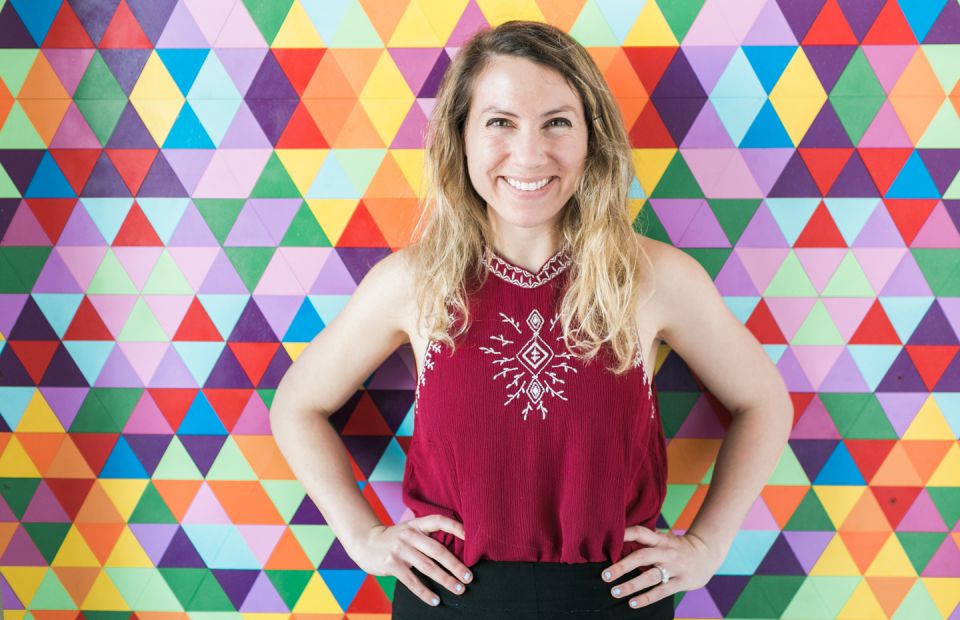As a student at Chapman University’s Conservatory of Music, Jessica Barone dreamed of singing on Broadway. But between vocal training sessions, she also started a tech blog. And when she wrote her thesis on the intersection of music and technology, tech won out. Just like that, she went from the stage to Silicon Valley.
Though she lacked experience, Jessica tackled those early years in the tech industry with the poise of a performer, working in social media at several startups and Google before landing at Facebook as a Content Specialist.
Music and tech may seem unrelated, but the common denominator is her powerful voice. At Facebook, her writing helps businesses connect with the world. But as a woman in a male-centric work environment, speaking up hasn’t always come easily for her. So she advocates for gender equality in tech through every means possible: participating in Facebook’s women’s advancement committee, encouraging younger women on panels, and posting on Medium.
Certainly, Jessica proves the power of an authentic, unapologetic voice. But she balances that conviction with her desire to learn and to “be a good partner” to everyone around her.
Here’s hoping that Jessica inspires you to speak out—and to listen, too.
Her Starting Point
You majored in Vocal Performance at Chapman University’s Conservatory of Music. Did you plan to become a professional musician? How has your experience as a performer influenced your career?
I remember in high school, being so in love with the idea of going off to New York City and being on Broadway because I've always loved singing. So I can definitely say that was part of my drive for going to Chapman's Conservatory, to get the training to become a really strong performer in opera, musical theater, cabaret, you name it!
I can say this: I wish there were more music majors in Silicon Valley. There were a lot of skills I learned while studying music that have helped me develop my career at Facebook—the ability to meet really tight deadlines, to be well-spoken, and to project. In college, I had to learn how to read sheet music and how to sing in multiple romantic languages. Now at Facebook, it helps me so much to apply that same logic to learning SQL and programming languages.
What drew you to work in social media? Do you remember the moment you realized it was a field you’d like to pursue?
My senior year at Chapman, I was applying to grad schools because at the time, I thought I wanted to get a Ph.D. in music, and I was writing a thesis paper for submission, all about how technology has shaped music through history. I realized by the end of it that I was a lot more interested in the technology side of the paper.
I didn’t have that urge to live in those practice rooms, skipping meals and sleep, [which] seemed like a sign to me that, as much as I love making music, maybe this wasn’t what I would be willing to do 24/7 for the rest of my life.
Meanwhile, I was also an amateur tech blogger. I loved learning about the tech industry. I couldn’t shut up about it.
So after realizing my real passion was in tech, I turned down a few grad schools and instead moved to San Francisco for a drastic change. I dove head-first into the tech industry. I didn’t have any leads for a job, but I did have good friends who let me crash on their couches.
It wasn’t long after college that I found my first apartment and started working as a copywriter and social media manager at my first startup, Coffee Meets Bagel. From then on, I was hooked and have been in tech ever since.
Before landing at Facebook, you worked in social media at various companies, including Google. How did those experiences prepare you for your current role?
Startups are great for trying out new fields, and I got to get a lot of leadership experience spearheading projects in marketing, design, and technical spaces. Coming from a music background, getting the chance to prove I could also dive into technical issues and work cross-functionally with product managers and engineers really helped my resume evolve, which is what led to me to start working at bigger companies like Google. I'll also say that, even though Google is huge, it still has a startup feel that encourages people to push themselves. For example, my role at Google as a Content Strategist wasn't confined to writing only. There were many instances where I got to partner with Marketing, Design, Legal, and Product to innovate on the projects I was working on.
When you were breaking into tech, what do you wish someone had told you?
I wish someone had told me to embrace coding sooner. By no means am I writing and landing code at Facebook now! But I am such a better partner to the engineers I work with at Facebook because I enjoy tinkering with programming languages like Javascript in my free time. It helps me articulate the goals of my projects but also to prioritize technical projects based on how much engineering work they would take.

Her Big Break
Tell us about your role as a Content Specialist at Facebook. What does an average day look like for you? What is the ultimate goal for your job?
I work on the Ads Help & Education team, which is primarily a team of amazing technical writers who work to make sure our Help Centers and education tools have the best content possible, so that businesses wanting to reach people on Facebook and Instagram know how to use our ads products.
My role as a Content Specialist can sound writing-centric, but my duties have definitely evolved over the approximately two years I've been at Facebook. These days, I support my team by tackling technical projects, like building new tools to make my teammates' jobs easier or providing more optimized education content for advertisers.
I'm a big advocate for face-to-face chats to get to the heart of a matter fast, so after my morning coffee and answering emails, I usually try to visit the desks of engineers I'm working on projects with to answer clarifying questions in person. Facebook attracts some of the most kickass, smartest people in the world, so I always enjoy picking my engineers' brains in person when we're trying to fix a roadblock in our projects. A big part of my role is articulating my goals, my team's goals, and also listening to my engineers’ points of view to make the best products possible.
I’m there to unblock people, make sure they have the resources they need, and fill in where I can.
Social media changes constantly. How do you stay on top of the latest trends and technologies when managing partnerships?
Working at Facebook, one of our core values is to move fast, use our own products, and provide meaningful, constructive feedback to our teams to make sure we're always pushing ourselves.
As I mentioned, Facebook attracts some of the brightest people in the world, but also the most innovative. With that much brainpower and drive, managing partnerships is always exciting, not to just stay on top of trends, but to blow past them.
What has your experience been as a woman in the tech industry?
It took me a while to learn how to speak up about being a woman in the tech industry. Getting into tech after college, I couldn’t name any great female role models who inspired me. I had to look a little harder to find them. And I also felt too timid to speak up about my thoughts about the lack of women in the industry, being surrounded by guys in some of the startups I worked at. But once I did find those role models and mentors, my confidence grew and so did my voice.
Today, it's clear that Silicon Valley still has a lot of work to do to increase diversity and I don’t blink when I say that. It's a complex issue with a lot of different facets, and my experience has varied at the different startups I've worked at. Sometimes I would be the only woman on a team, which has made me feel like the odd one out. But I've also worked at startups that were all women at the time I was there (Coffee Meets Bagel). Now at Facebook, it's clear how much our company values diversity and is working to bring gender equality into the workplace, with fantastic leaders like Sheryl Sandberg always serving as a beacon. I also feel really lucky to have some amazing women leaders as role models on my own Facebook team. My manager is an amazing woman who always makes me want to push myself, my manager's manager is also a kickass woman (and former veteran and pilot) that I hope to be like as I grow.
But like I said, there's still plenty of work to do before we have true parity in the tech industry and at Facebook, which is why I try to talk to girls in middle school, high school, and college about tech as often as I can. I also offer advice to smaller women's groups at startups who want to tackle gender equality in the workplace before they get too big, as well as working tirelessly to create opportunities for my fellow female coworkers at Facebook on the internal Women@Facebook Steering Committee.
Tell us about your role on Women@Facebook, which is an initiative to increase gender diversity at the company, right? What inspired you to join the committee? What are the most rewarding and difficult aspects of that role?
More than any other company I'd worked with before in Silicon Valley, I felt like I had a lot of great female role models to look up to at Facebook. But I was also aware that there was still plenty to be done in order to have true diversity at Facebook, and Women@Facebook stood out to me as a group that was working especially towards that goal.
I'd have to say that, since becoming a lead on the Women@Facebook steering committee, I've had the chance to collaborate with the most amazing women, both at Facebook and externally, who I'd never have the opportunity to meet, let alone work alongside, if I wasn't part of Women@Facebook.
It’s hard to accept that gender equality in Silicon Valley won’t be fixed overnight. That has to be the most difficult aspect of working on the Women@Facebook committee—to maintain that sense of patience, chipping away at the diversity problem in tech, one event or connection at a time. I’m just not a patient person!

Her Perspective
As an active mentor, what role have mentors played in your own career, both within and outside your company? What have you learned from them?
I've had some really great mentors during college and my career. One of my professors in college spent so much time helping me hone my writing style and get competitive internships at Pacific Symphony in the summers, which really helped me develop a sense of professionalism that I would have floundered without after college.
And then letting smart, talented friends who were more experienced in the tech industry serve as mentors after I graduated—to talk about my career with and even introduce me to some really great startups to work at—all helped me. Mentors in my life have listened, have opened doors, have believed in and taught me. Now I have mentors at Facebook who help me steer my growth, teach me Javascript with patience, and are always encouraging me to push myself.
Mentors in my life have taught me how impactful it can be to listen and to open doors for others (or even just a window) because it can be the step they need right before their big break.
In a recent post on Medium, you encouraged women in tech to embrace their femininity in a male-centric culture. What can tech companies do to encourage more self-expression among their female employees?
My biggest suggestion is for companies to change their vocabulary. Women who speak up in meetings or dissent aren't "difficult," or "bossy," they're investing thought and energy into what you're having them work on. Women who wear skirts aren't "flirting," they're just being their authentic selves. Companies that have too few women in leadership roles (or none at all) are probably guilty of labeling women in these ways. Men who take charge in meetings or push for aggressive deadlines are much less likely to be called “bossy.” Sometimes people don't even realize they have these unconscious biases, but they can be fatal to the diversity of their boardrooms.
To any company or manager (male or female!) trying to improve diversity on their teams, and who really wants gender equality (and who doesn’t? Studies show that a diverse workplace is more successful), I'd say to [them]: Take a moment to think about whether you've ever described an employee as bossy or difficult or maybe found yourself questioning an employee’s credibility because they’re wearing a dress instead of pants. You may realize you’re holding people back who are actually doing phenomenal work, but they just don’t fit the “appearance” of leadership you’re used to.
You frequently speak to high school and college women about breaking into tech. What are their biggest concerns? What is the biggest piece of advice that you give them?
I hear concerns about "not being technical enough" very often. Not everyone is a software engineer. I get asked a lot about whether a Computer Science degree is the only way to work in Silicon Valley. But I can personally say that, as a former music major, that's not true!
My biggest piece of advice for others wanting to break into the tech industry is to follow what you're passionate about and never stop applying for your dream job. Even if you have to work at a few startups in between, you may discover that a particular startup actually fits you perfectly and find your dream job there!
Lots of readers would love to work at Facebook. How would you recommend someone who’s interested in your team start out in the industry? When you’re hiring, what qualities stand out to you?
I highly recommend any non-computer science degree holders to try out a startup before applying to Facebook. You learn a lot about the tech industry at an incredibly fast pace, though I will also say that every team is different and on my team, for example, we even have some amazing folks who were never in startups, but instead came from MBA or journalism backgrounds.
Some of the best qualities that stand out are:
1. A willingness to learn new things.
2. Strong writing abilities. This holds true no matter what role you’re applying to at Facebook. If you can make a point via email or tell a clear story in a presentation, you have a valuable skill.
3. A background in the tech industry. Even if it wasn't a huge company like Google, it helps for candidates to have experience working in fast-paced, dynamic environments like startups, where you show that you can ramp up fast, roll up your sleeves, and get your hands dirty when needed.
4. SQL knowledge! Facebook is a data-driven company and data is what proves what's working, what's not, and what's worth investing in. I learned how to use SQL when I came to Facebook, but it's a desired skill to have, no matter what role you're applying for.
And finally what do you wake up looking forward to? What’s next for your career?
I love waking up every day thinking about the next big conversation I’m going to have about Facebook’s future. Facebook is a social network, after all, and being socially engaged with different teams, having deep discussions in meetings, or just catching someone for coffee to share an idea is big here. I love how working at Facebook allows its employees to build things that impact over a billion people around the world. So there is a sense of responsibility, but also a sense of urgency, that drives people to come to work every day and tackle big, meaningful projects, myself included.
As I continue moving into a more technical space and having more deep, meaningful conversations about the future, I see the next step in my career in product management or technical program management, bringing design, engineering, and colorful ideas to life every day.
You May Also Like
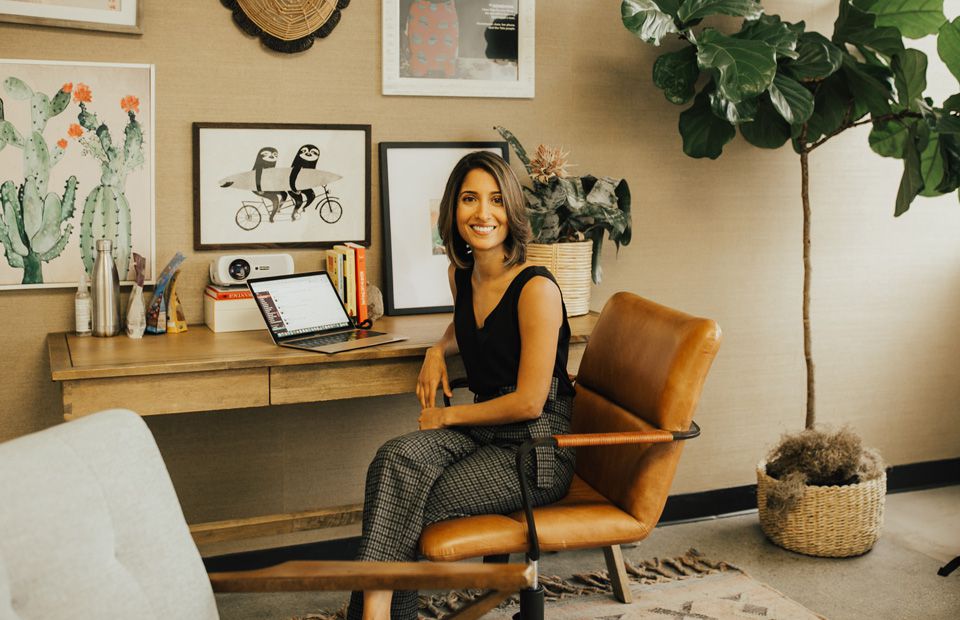
Technology
A Tech Founder on Why Being an Outsider Is a Strength
"I actually think most successful founders are rebels, of a sort. We’re trying to do new things and take on entrenched systems or ways of thinking. What makes me and our company different is that we’re outsiders."
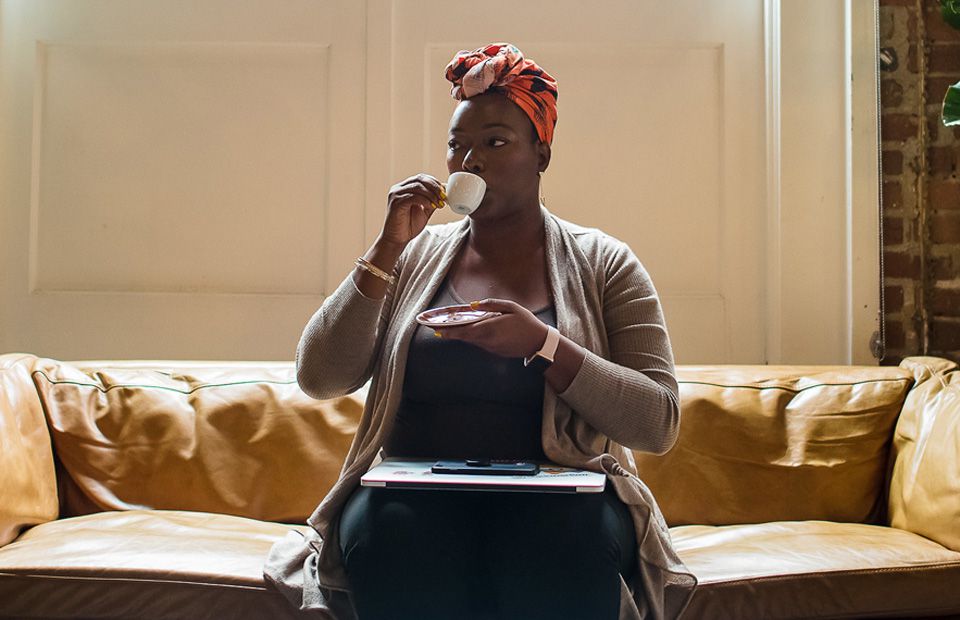
Technology
Omoju Miller—Tech Veteran, Leader, and Volunteer Advisor to the Obama Administration—on The Crucial Role of Creativity in the Tech Industry
"If you are in an environment where you feel marginalized, leave. Don’t try to change it. Go and look for a place that sees you and lets you be you."
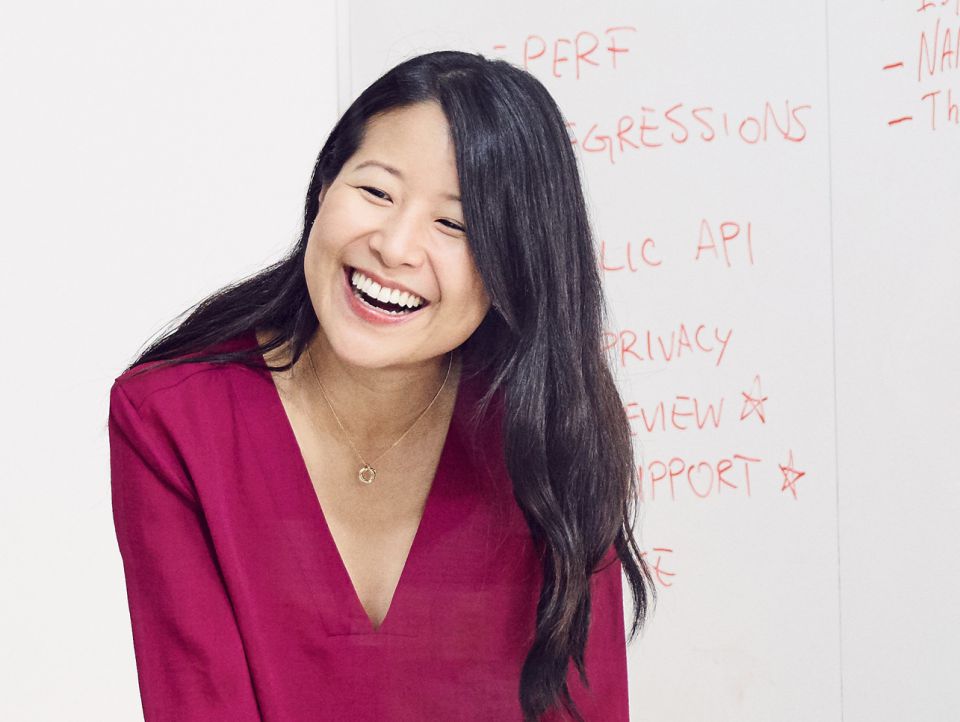
Technology
Sharing Stories as a Software Engineer
We sat down with Apple software engineer Emilie to learn about her day-to-day working at Apple along with what it takes to run the perfect meeting and her favorite ways to unwind.
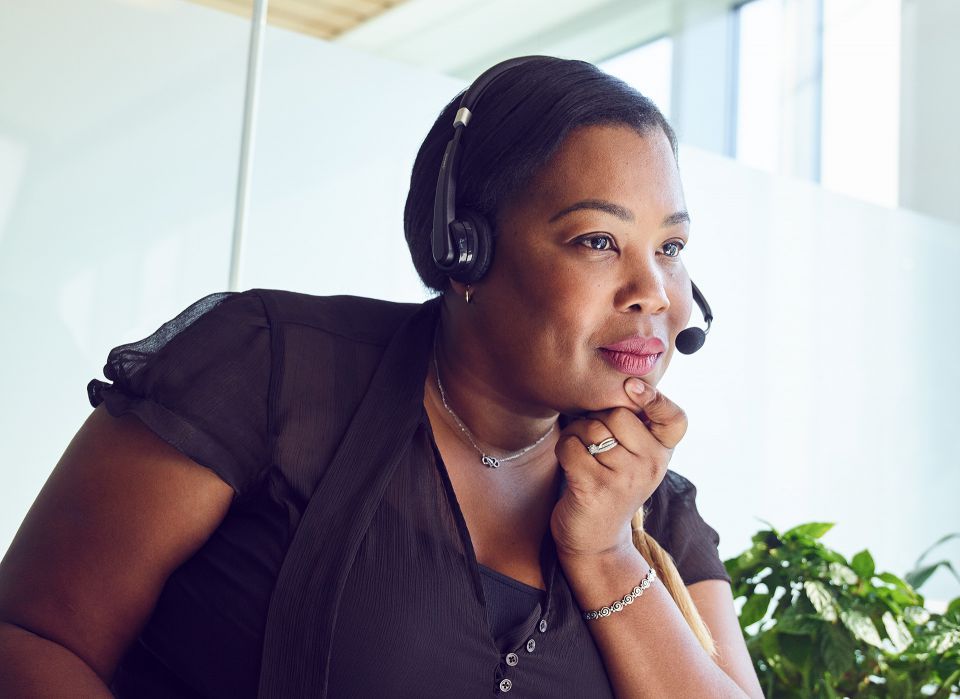
Technology
Creating Impact with Apple
We sat down with Apple's Senior Developer Partner Relations Advisor, Cris, to learn about what it takes to create a lasting impact within a large company. She shares a typical day in the life, her favorite book recommendations, and her top four tips to running a meeting.
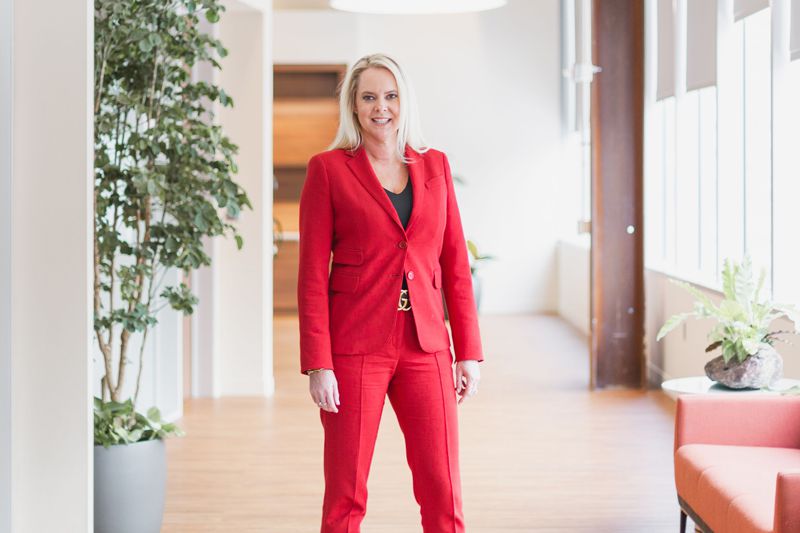
Technology
Salesforce’s Senior Vice President of Sales on Unconscious Bias, Failure, and Innovative Leadership
"Do not be afraid to fail, just bring your best self to the table."
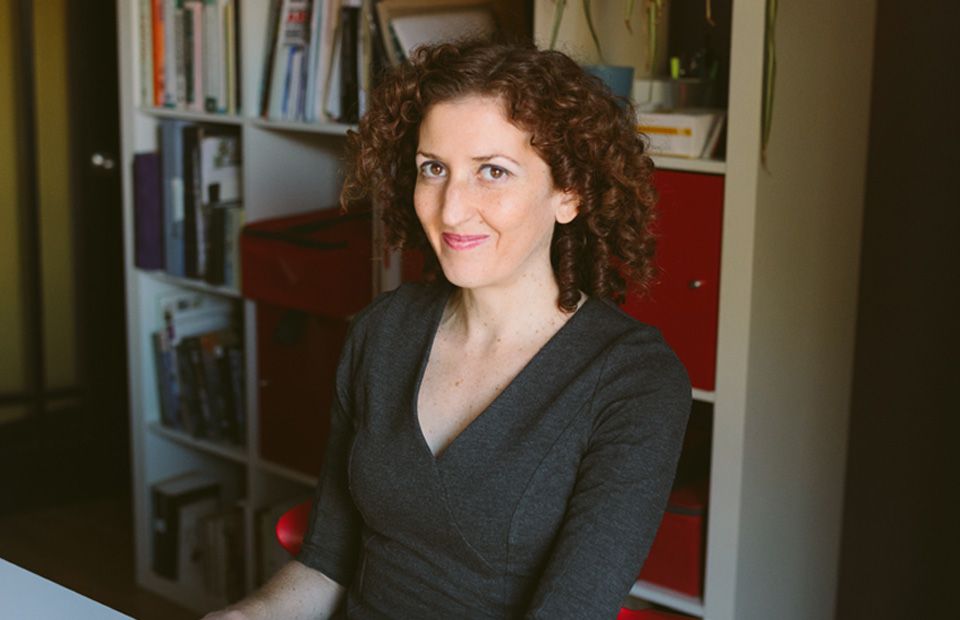
Technology
A Director of Engineering on Tech + Leadership
"I don’t believe in 'having it all'. If you spend more time on one thing, then you spend less time on another thing. All we can do is make choices on how to spend our time."
Get the Best Career Advice Delivered To Your Inbox
Join our newsletter to stay in the loop.
